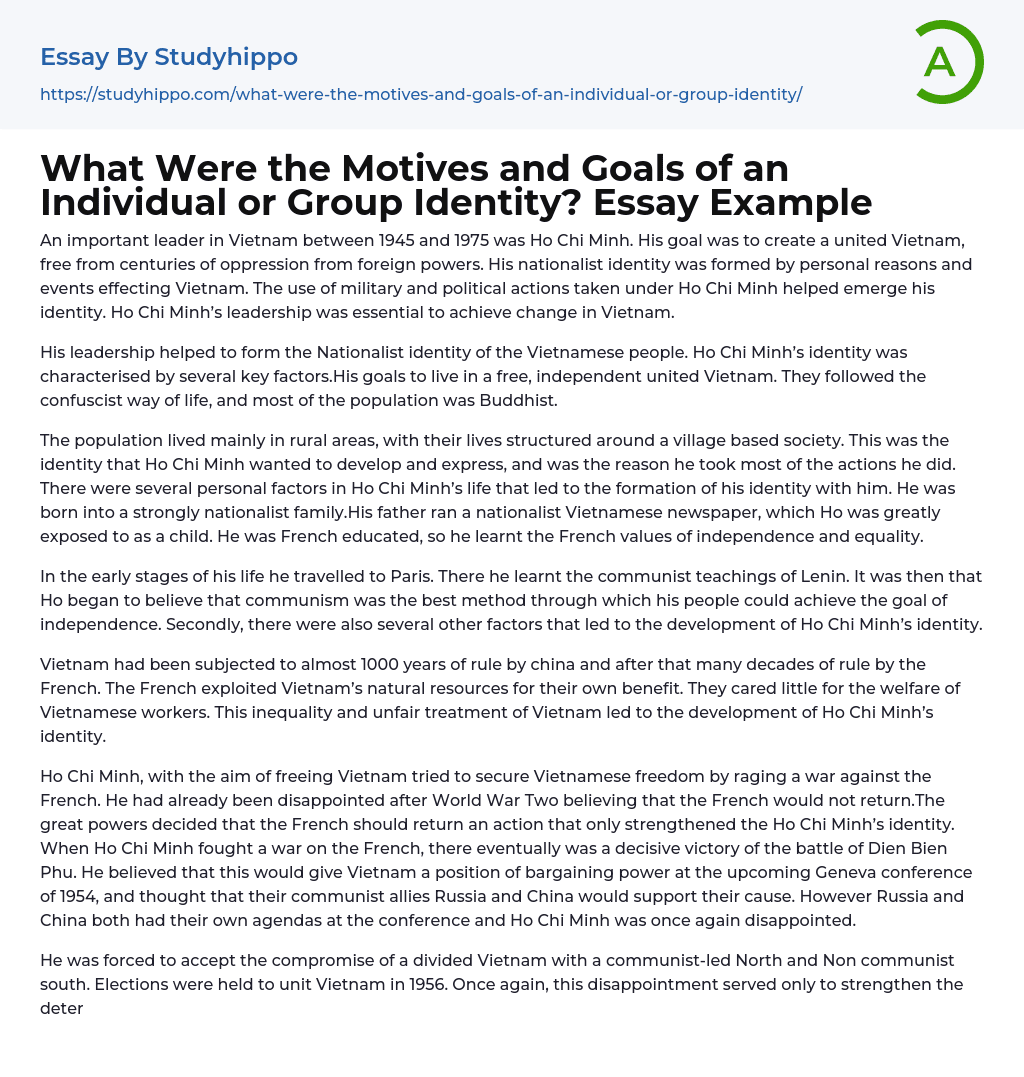

What Were the Motives and Goals of an Individual or Group Identity? Essay Example
Between 1945 and 1975, Ho Chi Minh was instrumental in Vietnam's efforts to achieve independence and unity, free from external control. His pursuit of nationalism was inspired by events that directly affected Vietnam, and he employed both military and political tactics to lead the country. Ultimately, his leadership played a crucial role in driving transformation within Vietnam.
By expressing his vision for a united Vietnam, Ho Chi Minh contributed significantly to the development of the Vietnamese people's Nationalist identity. Despite most of the population being Buddhist, he followed Confucian philosophy.
Ho Chi Minh aimed to cultivate and showcase the rural, village-centered society that comprised the majority of the population, which was integral to his personal identity and motives. Factors from his upbringing contributed to this identity, including being born into a family with strong nationalist ideals and exposure to his father�
...�s nationalist newspaper during his childhood. Additionally, his French education instilled in him values of independence and equality.
Ho Chi Minh's exposure to Lenin's communist teachings during his time in Paris led him to believe that communism was the most effective path towards independence for his people. This, combined with other factors, contributed to the formation of Ho's identity in his early life.
Following almost a thousand years of Chinese control, Vietnam was subsequently subjected to several decades of French dominion. During this period, the French utilized Vietnam's natural resources for their own benefit without regard for the welfare of Vietnamese laborers. This discriminatory treatment and disparity triggered Ho Chi Minh's development of self-identity.
Ho Chi Minh fought against the French in an effort to secure Vietnamese independence. Despite initial optimism after World War Two, Ho Chi Minh's disillusionment
grew when it became clear that the French would return. However, this adversity bolstered his resolve and ultimately led to a stronger sense of identity. After waging war against the French forces, Vietnam achieved a significant victory at Dien Bien Phu which gave Ho Chi Minh hope for the upcoming Geneva conference in 1954. He believed that communist allies China and Russia would support their cause and provide much-needed bargaining power. Regrettably, both countries had their own agendas at the conference, leaving Ho Chi Minh with yet another disappointment.
After being compelled to agree to a split Vietnam that comprised a communist-led North and a non-communist South, there was an attempt to achieve unity by conducting elections in 1956. However, this outcome only bolstered Ho Chi Minh's resolve to bring about a united and independent Vietnam. Consequently, his military actions exposed his sense of selfhood.
During World War II in Japan, Ho Chi Minh led the resistance against Japanese occupation and urged for a mass revolt upon their surrender on August 10, 1945 with the message "Break open the rice stores to prevent famine". Furthermore, Ho orchestrated anti-French opposition in France after World War I that resulted in the initial Indochina War.
Ho Chi Minh led a guerrilla campaign from the mountains to secure Viet Minh's survival during their escalating conflict with France. The crucial victory at Dien Bien Phu in 1954 ensured the Viet Minh's position at Geneva peace talks where Vietnamese independence would be negotiated. Despite significant losses, Ho Chi Minh was determined to achieve this goal.
Ho Chi Minh's political actions reflected his sense of identity. At the 1919 Versailles peace conference, he submitted a list
of Vietnamese demands, which was disregarded. Nonetheless, this act garnered respect for him in Vietnam. In 1925, he established the Revolutionary Youth League of Vietnam, believing it would play a vital role in the revolution. In 1940, Ho created the Viet Minh.
The unification of nationalist groups gave rise to the coalition known as Viet Minh, which was led by Ho Chi after receiving training in China. The organization aimed to use any possible means to achieve Ho Chi's vision of an independent state. In August 1945, following Japan's departure from Vietnam, Ho established a self-governing body in Hanoi and declared the country a Democratic Republic.
Ho Chi Minh utilized the American Declaration of Independence's phrases, including "All men are created equal" and "endowed by their creator with certain inalienable rights, among these are life, liberty and the pursuit of happiness," to form a nationalist identity for Vietnamese people and create a united Vietnam. Despite lacking sufficient power to resist French opposition, Ho negotiated an agreement that granted the DRV independence within the French Union of Indochina. Nevertheless, this deal was unsatisfactory for both parties and short-lived.
Ho Chi Minh's leadership was influenced by his personal experiences and the struggles Vietnam faced. As the leader of the Viet Minh, he guided actions to express Vietnamese identity.
- Goal Setting essays
- Accomplishment essays
- Cultural Identity essays
- Attitude essays
- Goals essays
- Personal Goals essays
- Personal Life essays
- Personality essays
- Principles essays
- Reputation essays
- Self Awareness essays
- Self Esteem essays
- Self Reflection essays
- Self Reliance essays
- Strengths essays
- Value essays
- Values essays
- Weakness essays
- Who Am I essays
- African American essays
- African American Culture essays
- American Values essays
- Asian American essays
- Chinese essays
- Ethnicity essays
- Ethnocentrism essays
- German essays
- Han Chinese essays
- Hispanic essays
- Identity essays
- Korean essays
- Mexican essays
- Nation essays
- Native American essays
- Race and Ethnicity essays
- White People essays
- Absolutism essays
- Appeal essays
- Bourgeoisie essays
- Contras essays
- Corporate Governance essays
- Corruption essays
- Democracy essays
- Democratic Party essays
- Developed Country essays
- Dictatorship essays
- Elections essays
- European Union essays
- Federalism essays
- Foreign essays



